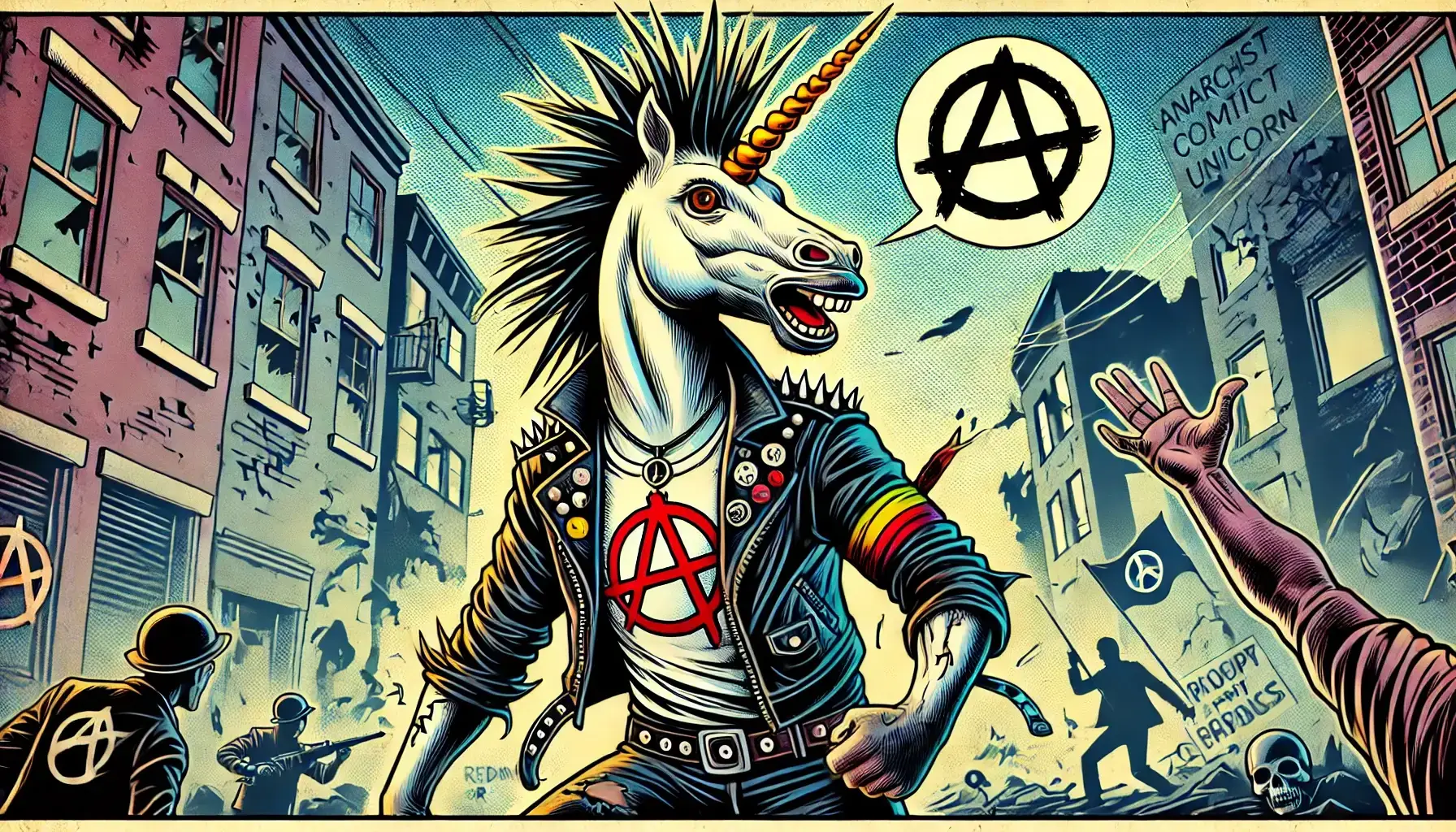Anarchism: The Unicorn of Political Philosophy

Anarchism, as a concept, exists in the same way unicorns do: it is “real” in that we can imagine and discuss it, but it does not exist in the wild. Despite its appeal to those who romanticize rebellion against the evils of the world, anarchism is ultimately a dead-end philosophy—one that collapses under the weight of human nature, practical necessity, and the very structures it claims to oppose. The more anarchists attempt to resist the state, the more they inadvertently recreate micro-states or rely on the very systems they reject.
Anarchism Is A Political Mythology
A. Fantasies of Wasted Youth
- Like the unicorn, anarchism is captivating because of its elegance and idealism. It paints a picture of a world free from coercion, hierarchy, and oppression.
- However, this vision is purely mythological. Anarchism has never existed in a sustainable form, and every attempt to realize it has either failed outright or evolved into something else.
B. The Reality of Human Behavior
- The fundamental flaw of anarchism lies in its denial of human nature:
- People naturally form hierarchies, even in the absence of formal structures.
- Conflicts arise, and resolving them requires systems of mediation, enforcement, and governance—whether anarchists like it or not.
- The anarchist dream of a stateless society ignores these realities, making it as unworkable as a unicorn is as a riding animal.
Anarchist Communities Are Poorly Run Micro-States Paradoxes
A. Resisting the State, Recreating It
- When anarchists organize, they often end up forming micro-states that replicate the very dynamics they claim to oppose:
- Informal hierarchies emerge, with charismatic or forceful individuals assuming leadership roles.
- Resources are controlled and distributed according to rules or norms, creating systems of governance, even if unofficial.
B. The Individual as a Dependent of the State
- Those anarchists who reject collective living often end up as isolated individuals, but even they cannot escape dependence on state-run systems:
- They rely on businesses regulated by the state for essentials like gas, food, and electricity.
- They exist within legal frameworks that protect their rights to speech, property, and movement, whether they acknowledge it or not.
Anarchism Always Fails in Practice
A. The Collapse of Community
- Anarchist communities often crumble under their own contradictions:
- Without formal structures, they fail to manage disputes, allocate resources fairly, or enforce rules.
- These failures breed distrust, exploitation, and fragmentation, leaving the community weaker than when it began.
B. The Isolated Anarchist
- The individual anarchist, disconnected from both the state and any community, is often left to rely on underground economies or state-regulated services:
- They drive on public roads, use state-issued currency, and benefit from public infrastructure, all while denouncing the state that provides these things.
- This reliance reveals the practical impossibility of living a truly stateless life in a modern society.
C. The Fiction of Stateless Freedom
- Anarchists often claim that stateless societies would be freer, but history and human behavior suggest otherwise:
- Without shared systems of governance, the strongest or most aggressive individuals tend to dominate, creating systems of oppression far worse than those imposed by democratic states.
- Stateless societies are not inherently egalitarian; they often devolve into authoritarian rule by the few.
Anarchists Even Reject Self-Regulation
A. The Enabling of Dysfunction
- Many anarchist communities tolerate or even celebrate behaviors that undermine their stability:
- Substance abuse is often romanticized as a form of personal freedom, but it erodes the community’s ability to function.
- Exploitation—whether sexual, emotional, or economic—thrives in the absence of systems to hold people accountable.
B. Laziness Disguised as Philosophy
- Anarchism provides an intellectual loophole for those who wish to avoid responsibility:
- By rejecting the state, anarchists absolve themselves of the hard work of participating in governance or reform.
- This laziness often manifests as empty rhetoric or performative rebellion, rather than meaningful action or contribution.
C. A Culture of Self-Indulgence
- Many anarchists focus more on preserving their personal freedoms—often to the detriment of others—than on building systems that promote liberty for all:
- Their fixation on individualism leads to fragmented communities and uncooperative behaviors.
- This selfishness undermines their stated goals of mutual aid and collective well-being.
The Political No Outlet For Perpetual Teen Angst
A. Idealism Without Practicality
- Anarchism’s greatest strength—its idealism—is also its greatest weakness:
- By rejecting all forms of coercion and hierarchy, it leaves itself without the tools to address the realities of human society.
- Its refusal to compromise or engage with existing systems ensures that it remains a fringe philosophy, incapable of effecting real change.
B. The Inescapable Need for Structure
- Every society, no matter how small, requires systems of governance to manage conflicts, enforce rules, and protect rights:
- Anarchism’s denial of this reality makes it fundamentally unworkable as a political philosophy.
- Even anarchist communities eventually create structures that resemble the states they reject, proving the fiction of their ideals.
C. The Hollow Appeal of Rebellion
- The romanticism of anarchism appeals to those who want to feel morally superior without taking responsibility for their actions:
- It provides a narrative of rebellion and purity, but it is ultimately hollow, offering no solutions to the problems it critiques.
- In practice, anarchism is less about building a better world and more about rejecting the one that exists.
Anarchism, Dehorned
Anarchism, like the unicorn, exists as a concept but not as a reality. It appeals to those who are drawn to its romantic ideals, but its flaws are insurmountable in practice. The closest anarchists come to achieving their vision is either by creating poorly run micro-states or isolating themselves as individuals reliant on the very systems they claim to oppose.
At the end of the day, anarchism is a dead-end philosophy. It allows its adherents to live as though they are morally and intellectually superior, but it ultimately shields them from accountability and responsibility. If anarchists truly wish to create a freer world, they must abandon the fiction and engage with the realities of governance, human behavior, and the complexities of modern society. Until then, anarchism will remain what it has always been: an idealistic dream, forever unrealized.
